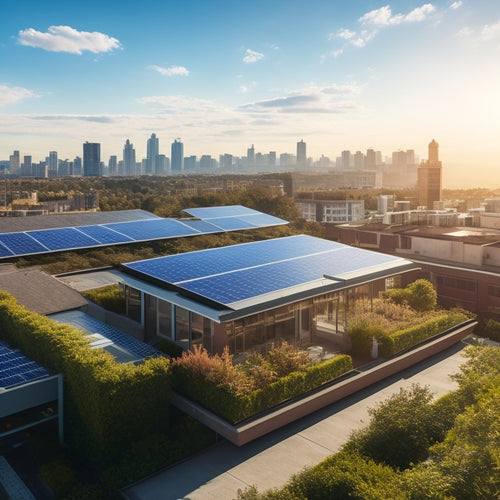
Can I Install a Residential Home Solar System
Share
You can determine your eligibility to install a residential home solar system by evaluating your energy needs, reviewing your home's suitability, and understanding local building codes and regulations. Start by reviewing past utility bills to gauge your energy consumption, considering future expansions and energy-efficient upgrades. Next, evaluate your roof's size, shape, and orientation to confirm it can accommodate solar panels. You'll also need to research local building codes, calculate the right system size, and consider energy storage options. As you weigh these factors, you'll uncover the details you need to make an informed decision about installing a solar system that meets your unique needs and circumstances.
Key Takeaways
- Assess your home's energy needs by reviewing past utility bills and considering potential future expansions.
- Ensure your roof is suitable for solar panels by evaluating its size, shape, and shading.
- Choose the right system size based on your energy needs, local climate, and available incentives.
- Evaluate your roof's condition and consider energy storage options to maximize solar energy utilization.
- Calculate the total cost and savings of a solar system, including financing options and tax incentives.
Understanding Your Energy Needs
Typically, homeowners contemplating a residential solar system begin by evaluating their energy requirements, as this determines the size and type of system needed.
You'll want to assess your current energy consumption patterns to guarantee the system you install meets your needs. This involves reviewing your past utility bills to identify your energy usage in kilowatt-hours (kWh). You should also take into account potential future expansion, such as adding more appliances or electric vehicles, to make certain your system can accommodate increased energy demands.
When evaluating your energy needs, reflect on the size of your home, the number of occupants, and the type of appliances you use.
You may also want to contemplate energy-efficient upgrades, such as LED lighting or Energy Star-rated appliances, to reduce your overall energy consumption.
Assessing Your Home's Suitability
When evaluating your home's suitability for a solar system, you'll need to assess your roof's size and shape to determine if it can accommodate the necessary number of panels.
You'll also need to research local building codes and regulations, which may impact the system's design and installation.
Roof Size and Shape
Your roof's size and shape play a significant role in determining its suitability for a residential home solar system. The amount of space available on your roof will impact the number of solar panels you can install, which in turn affects the amount of electricity you can generate.
Here are three key considerations when evaluating your roof's size and shape:
-
Roof orientation: A south-facing roof receives the most sunlight throughout the day, making it ideal for solar panels. East- and west-facing roofs can also work well, but north-facing roofs may not receive enough sunlight.
-
Shading analysis: Obstructions like trees, chimneys, and vents can cast shadows on your roof, reducing the effectiveness of solar panels. A thorough shading analysis will help identify the best placement for your solar panels.
-
Available space: The size and shape of your roof will dictate how many solar panels can be installed. A larger roof with minimal obstructions can accommodate more panels, resulting in more electricity generated.
Local Building Codes
Local building codes and permits play an essential role in evaluating your home's suitability for a residential solar system. Before installing a solar system, you need to verify that your property complies with local regulations and safety standards.
| Regulation | Description | Impact on Solar Installation |
|---|---|---|
| Zoning Laws | Govern land use and property development | May restrict solar panel installation in certain areas or require special permits |
| Building Codes | Guarantee safe construction and installation practices | Influence the type of solar equipment and installation methods used |
| Electrical Codes | Regulate electrical wiring and connections | Affect the installation of solar panels and inverters |
During the permitting process, your solar installer will need to submit plans and designs for approval. After installation, your system will undergo inspection to verify code compliance. Failing to meet local regulations can result in fines, removal of the system, or even void your warranty. It's vital to work with a qualified installer who is familiar with local regulations to guarantee a smooth and successful installation.
Choosing the Right System Size
You'll need to calculate the ideal system size for your residential solar installation, which involves evaluating your energy needs and determining the capacity of the system required to meet those needs.
This calculation will depend on factors such as your energy usage patterns, roof size, and local building codes.
System Size Calculations
Determining the ideal system size for your residential solar installation is crucial to maximize energy production and cost savings.
You want a system that can meet your energy demands, but not so large that it wastes resources and increases costs. To calculate the right size, you'll need to evaluate several factors.
Here are three key evaluations for system size calculations:
-
Your Energy Consumption Trends: Analyze your past energy bills to identify patterns and peak usage periods. This will help you determine how much energy you need to generate.
-
Solar Panel Efficiency: The efficiency of your solar panels will impact how much energy you can produce per hour of sunlight. Higher efficiency panels can produce more energy in smaller spaces.
-
Local Climate and Sunlight Exposure: The amount of sunlight your location receives will affect how much energy your system can produce. You'll need to assess factors like shading, roof orientation, and local weather patterns.
Energy Needs Assessment
Now that you've evaluated the key factors affecting system size, it's time to assess your energy needs and choose the right system size for your residential solar installation.
To do this, you'll need to determine your energy consumption patterns. Review your past electricity bills to identify your average daily energy usage in kilowatt-hours (kWh). Consider your energy usage during peak hours, such as summer afternoons, and factor in any energy-efficient upgrades you've made to your home.
Next, consider the solar incentives available in your area. While the cost of solar panels has decreased over the years, incentives like the federal solar investment tax credit (ITC) can still greatly reduce the upfront cost of your system.
Evaluating Roof Space and Condition
Optimizing your roof's real estate is vital for a successful solar installation, as the available space and condition of your roof will greatly impact the system's performance and longevity.
You'll need to assess your roof's orientation, which ideally should face south, to maximize energy production. A shading analysis is also important to identify any obstructions, such as trees or chimneys, that could reduce energy output.
To evaluate your roof's condition, consider the following factors:
-
Age and condition: Is your roof nearing the end of its lifespan or showing signs of wear and tear?
-
Structural integrity: Can your roof support the weight of the solar panels and withstand environmental factors like wind and snow?
-
Roof size and complexity: Is your roof large enough to accommodate the required number of solar panels, and are there any obstacles that could make installation more complicated?
Navigating Local Building Codes
How will your residential solar system align with local building codes and regulations?
It's crucial to verify your system meets the necessary standards to avoid costly rework or even system removal. Start by researching the specific codes and regulations in your area, which may vary depending on your location.
You'll need to obtain the necessary permits before commencing installation. A thorough permit application will require detailed plans and specifications of your solar system, including the type and quantity of equipment, installation methods, and electrical connections.
To confirm code compliance, work with a reputable solar installer who's familiar with local regulations. They'll guide you through the permit application process and guarantee that your system meets the required standards.
Additionally, many local governments offer resources and incentives for homeowners seeking to install solar systems, so be sure to investigate these opportunities.
Considering Energy Storage Options
Flexibility is key when it comes to utilizing the power of solar energy. As you consider installing a residential home solar system, you'll want to think about energy storage options to guarantee you can utilize the power of the sun even when it's not shining.
You have several options to choose from, including:
-
Battery Technologies: Advances in battery technologies have made it possible to store excess energy generated by your solar panels during the day for use at night or during power outages. Lithium-ion batteries, lead-acid batteries, and flow batteries are popular options.
-
Off-Grid Solutions: If you want to be completely independent from the grid, off-grid solutions allow you to store energy generated by your solar panels and use it to power your home. This option is ideal for remote locations or areas with frequent power outages.
-
Grid-Tie Systems: Grid-tie systems enable you to sell excess energy back to the grid during the day and draw from the grid at night or during periods of low energy production.
When evaluating energy storage options, consider your energy needs, budget, and lifestyle to determine which solution is right for you.
Calculating the Cost and Savings
Now that you've evaluated energy storage options, it's time to crunch some numbers. Calculating the cost and savings of a residential home solar system is essential to determining its feasibility. The total cost includes the system's purchase price, installation, and maintenance expenses.
However, various financing options can help offset these costs, such as loans, leases, and power purchase agreements. Additionally, you may be eligible for tax incentives, like the Solar Investment Tax Credit (ITC), which can greatly reduce your overall expenditure.
To estimate your savings, you'll need to assess factors like your current electricity usage, the system's energy production, and local electricity rates. A solar system can save you money by reducing your reliance on the grid and generating free energy.
You can use online tools or consult with a solar expert to get a more accurate calculation of your potential savings. By understanding the costs and benefits, you can make an informed decision about investing in a residential home solar system.
Hiring a Qualified Installer
With your cost-benefit analysis in hand, it's time to hand over the reins to a professional - a qualified solar installer who can bring your residential home solar system to life.
When selecting an installer, it's vital to evaluate their credentials. Look for installers certified by the North American Board of Certified Energy Practitioners (NABCEP) or the International Association of Electrical Inspectors (IAEI). These certifications guarantee the installer has the necessary knowledge and skills to design and install a safe and efficient solar system.
Here are three key aspects to take into account when hiring a qualified installer:
-
Installer credentials: Verify the installer's certifications, licenses, and insurance. A reputable installer will be transparent about their credentials.
-
Installation timeline: Discuss the installation timeline with your chosen installer. A clear timeline will help you plan and prepare for the installation process.
-
Warranty and maintenance: Clarify the warranty terms and maintenance requirements for your solar system. A qualified installer will provide an extensive warranty and maintenance plan.
Frequently Asked Questions
Can I Install a Solar System on a Rented Property?
You're like a ship without an anchor, stuck in rental limbo, wondering if you can utilize the sun's power on someone else's property. Typically, you'll need your landlord's permission, but solar leasing options and tenant rights can provide a way to tap into renewable energy, enabling you to take control.
Will Solar Panels Affect My Home's Resale Value?
You're wondering if solar panels will impact your home's resale value. The good news is that they won't; in fact, they'll likely increase it, thanks to solar panel benefits like home energy savings, which can be a major selling point for potential buyers.
Can I Use Solar Power During a Grid Outage?
You might be surprised that 70% of solar-powered homes still rely on the grid; however, with off-grid systems and battery storage, you can capture solar power during grid outages, ensuring a reliable energy supply when you need it most.
Are Solar Panels Maintenance-Intensive?
You'll be relieved to know that solar panels require minimal maintenance; their lifespan averages 25-30 years. Follow solar maintenance tips like cleaning and inspecting panels regularly to guarantee peak performance and extend their lifespan.
Can I Install Solar Panels on a Metal Roof?
You'll need specialized installation techniques and metal roof considerations, like ensuring a watertight seal and using compatible mounting hardware, to successfully install solar panels on your metal roof, which requires careful planning and execution.
Related Posts
-

Why You Need a Phone Mount for Navigation
When you're on the road, a reliable phone mount is not just a convenience, it's a safety necessity that helps you mai...
-

5 Ways Bike Sharing Boosts Urban Sustainability
As you explore bike-sharing options, you'll discover five ways it boosts urban sustainability. By reducing congestion...
-

What Is the Cost to Put in Solar Panels
You're likely considering solar panels for your home, and the most significant factor in your decision is the upfront...


